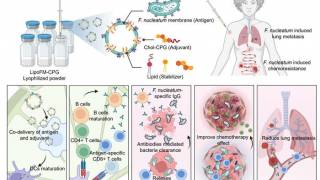Enhanced BRCA Cancer Gene Testing Approved

The U.S. Preventive Services Task Force (USPSTF) has broadened its criteria for BRCA cancer susceptibility gene testing in women.
The USPSTF now recommends that primary care clinicians assess women with either a personal or family history of breast or ovarian cancers, as well as women with Ashkenazi Jewish ancestry for their risk of BRCA1/2 mutations.
The USPSTF also recommends a 3-step process: a brief risk assessment with a validated tool, referral to genetic counseling if positive, and then BRCA1/2 mutation testing if indicated.
This final recommendation expands upon the Task Force's 2013 guidance, which had recommended risk assessment, genetic counseling, and BRCA testing 'only for women with a family history of breast or ovarian cancers.'
Risk assessment
- Mutations in the BRCA1/2 genes cluster in families, showing an autosomal dominant pattern of inheritance in either the mother’s or father’s family.
- When taking medical and family history information from patients, primary care clinicians should ask about specific types of cancer, primary cancer sites, which family members were affected, and whether relatives had multiple types of primary cancer.
- Clinicians should also inquire about the age at diagnosis, age at death, and sex of affected family members, both immediate (ie, parents and siblings) as well as more distant (ie, aunts, uncles, grandparents, and cousins).
- For women who have family members with breast, ovarian, tubal, or peritoneal cancer or have a personal history of these types of cancer, primary care clinicians may use appropriate brief familial risk assessment tools to determine the need for in-depth genetic counseling.
- Tools evaluated by the USPSTF include the Ontario Family History Assessment Tool, Manchester Scoring System, Referral Screening Tool, Pedigree Assessment Tool, 7-Question Family History Screening Tool, International Breast Cancer Intervention Study instrument (Tyrer-Cuzick), and brief versions of BRCAPRO.
- Each of these tools has been validated and accurately estimate the likelihood of carrying a harmful BRCA1/2 mutation. They can be used to guide referrals to genetic counseling for more definitive risk assessment.
- General breast cancer risk assessment models (the National Cancer Institute Breast Cancer Risk Assessment Tool, which is based on the Gail model) are not designed to identify BRCA-related cancer risk and should not be used for this purpose.
- In general, these brief familial risk assessment tools include factors associated with an increased likelihood of potentially harmful BRCA1/2 mutations. These include breast cancer diagnosis before age 50 years, bilateral breast cancer, presence of both breast and ovarian cancer in one individual, male family members with breast cancer, multiple cases of breast cancer in the family, 1 or more family members with 2 primary types of BRCA-related cancer (such as ovarian cancer), and Ashkenazi Jewish ancestry.
- The USPSTF recognizes that each risk assessment tool has advantages and limitations and found insufficient evidence to recommend one over another.
Genetic Counseling
- The process of genetic counseling includes detailed kindred analysis and risk assessment for potentially harmful BRCA1/2 mutations. It also includes identification of candidates for testing, patient education, discussion of the benefits and harms of genetic testing, interpretation of results after testing, and discussion of management options.
- Genetic counseling about BRCA1/2 mutation testing should be performed by trained health professionals, including suitably trained primary care clinicians. Several professional organizations describe the skills and training necessary to provide comprehensive genetic counseling.
Genetic Testing
- Testing for BRCA1/2 mutations should be performed only when an individual has personal or family history that suggests an inherited cancer susceptibility, when an individual is willing to talk with a health professional who is suitably trained to provide genetic counseling and interpret test results, and when test results will aid in decision-making.
- Clinical practice guidelines recommend that BRCA1/2 mutation testing begins with a relative with known BRCA-related cancer, including male relatives, to determine if a clinically significant mutation is detected in the family before testing individuals without cancer.
- If an affected family member with a BRCA-related cancer is not available, then the relative with the highest probability of mutation should be tested.
- The type of mutation analysis required depends on family history. Individuals from families with known mutations or from ancestry groups in which certain mutations are more common (eg, Ashkenazi Jewish founder mutations) can be tested for these specific mutations.
- Because risk assessment is primarily based on family history, it is unclear how women with a limited or unknown family history should be assessed for BRCA1/2 mutation risk and potential referral to counseling or genetic testing.
- Tests for BRCA1/2 mutations are highly sensitive and specific for known mutations. The availability of testing options has changed since the 2013 US Supreme Court ruling that determined human genes are not patentable (Association for Molecular Pathology et al v Myriad Genetics Inc et al).
- Previously, BRCA1/2 mutation testing in the United States was mainly conducted by 1 laboratory.
- Since the ruling, the number of testing options has significantly increased, with more than 80 multigene panels that include BRCA1/2, as well as tests marketed directly to consumers.
- Guidelines from the American College of Medical Genetics and Genomics, which were updated in 2015, recommend new standard terminology for reporting BRCA1/2 mutations identified by genetic tests.
- These include a 5-tier terminology system using the terms “pathogenic,” “likely pathogenic,” “uncertain significance,” “likely benign,” and “benign.”
Treatment and Interventions
- Management of increased cancer risk related to BRCA1/2 mutations is beyond the scope of this Recommendation Statement.
- In general, care for women with harmful BRCA1/2 mutations consists of a variety of interventions to lower future cancer risk.
- This includes intensive screening, risk-reducing medications, and risk-reducing mastectomy and salpingo-oophorectomy.
Additional Tools and Resources
- The National Cancer Institute Cancer Genetics Services Directory provides a list of professionals who offer services related to cancer genetics, including cancer risk assessment, genetic counseling, and genetic testing.
Other Related USPSTF Recommendations
- The USPSTF recommends that clinicians offer to prescribe risk-reducing medications such as tamoxifen, raloxifene, or aromatase inhibitors to women at increased risk for breast cancer and at low risk for adverse medication effects (B recommendation).
- It recommends against the routine use of medications for risk reduction of primary breast cancer in women not at increased risk for breast cancer (D recommendation).
- The USPSTF recommends against screening for ovarian cancer in women (D recommendation). This recommendation does not apply to women with known genetic mutations that increase their risk for ovarian cancer (eg, BRCA1/2 mutations).
- The USPSTF found insufficient evidence to assess the balance of benefits and harms of performing screening pelvic examinations in asymptomatic women for the early detection and treatment of a range of gynecologic conditions (I statement).
Research Needs and Gaps
- Research on risk assessment and testing for BRCA1/2 mutations has focused on short-term outcomes for highly selected women in referral centers. To determine the best approaches for population-based risk assessment and testing, more research is needed about mutation prevalence and effects on the general population as well as ethnicities or ancestries associated with BRCA1/2 mutations.
- Because risk assessment is primarily based on family history, more research is needed to better understand how women with an unknown family history should be assessed for BRCA1/2 mutation risk.
- Additional studies are needed, including comparative effectiveness trials, of approaches to risk screening and strategies to improve access to genetic counseling, as well as BRCA1/2 testing for high-risk individuals.
Our Trust Standards: Medical Advisory Committee

























